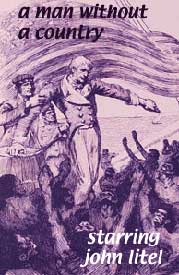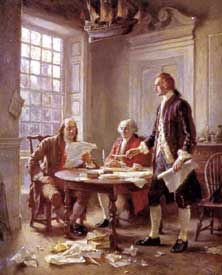An old technicolor historical drama entitled The Declaration of Independence (1938) is rather overtly intended as educational, but startling in the beauty of its sets, costumes, & muted colors intended to capture the mood & feel of oil paintings.
Scenes & sets are based on classic paintings like John Trumbull's oil painting "The Declaration of Independence" showing the Continental Congress at the signing, & Jean Leon Gerome Ferris's "Drafting of the Declaration of Independence."
John Hancock (Henry Hall) calls a congressional gathering to Philadelphia, to debate whether or not the Colonies should break away from Great Britain. Thomas Jefferson (John Litel) reads a statement in support of independence from George Washington, & other historical figures make their statements for or against what would inevitably mean Revolution.
Jefferson afterward begins drafting the Declaration, with input for the draft at a table with Ben Franklin (Walter Walker) & John Adams (Ferris Taylor), arrayed exactly as in the painting shown above!
During this discussion, Jefferson is talked out of his initial sentiment that slavery should be banned, &am preference to same stricken from the Declaration. For 1938, this was a great piece of the historical puzzle to write into the script.
The Loyalist group of Matthew Kramer (William Orlamond) is also shown, along with their attempt to stop Ceasar Rodney of Delaware (Ted Osborne) from reaching Philadelphia for the sake of a pivotal vote. Rodney's race across the countryside & ambush provides excellent moments of swashbuckling action.
 The climax is the signing of the Declaration. It's charming, declarative little film which won the Oscar for best short subject. The climax is the signing of the Declaration. It's charming, declarative little film which won the Oscar for best short subject.
The Declaration of Independence is included among the extras with the Turner Classics dvd A Slight Case of Murder (1938) starring Edward G. Robinson, a film from Turners' "Tough Guys" collection, though it strongly clashes thematically.
Crane Wilbur's companion piece for Declaration was A Man Without a Country (1937), based on a poetic tale by Edward Everett Hale written in 1863, beautifully adapted to the screen as a gorgeous technicolor two-reeler. It, too, can be found in the "tough guys" series, among the extras with Bogart & O'Brien's San Quentin (1937).
Director Crane Wilbur uses some of the same staff & actors for both of his patriotic films. John Litel is sensitive & moving as Lt. Philip Nolan, who is the Man without a Country, who actually did exist.
Nolan faces a military court martialled for his support of Aaron Burr (Holmes Herbert). He foolishly speaks a traitorous thought against America, that he would glad never to set foot on her soil again. A military tribunal sentences him to life at sea, never again to set foot in his country.
The deep tragedy is very harshly felt in the original novelette but only a little less gloomy in the adaptation. Nolan shunted from ship to ship over the years, changing ships while at sea so as never to arrive in any port, comes off very nearly as a tale of psychological torture & terror.
copyright © by Paghat the Ratgirl
|

 The climax is the signing of the Declaration. It's charming, declarative little film which won the Oscar for best short subject.
The climax is the signing of the Declaration. It's charming, declarative little film which won the Oscar for best short subject.